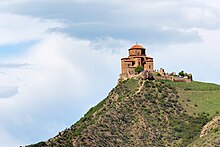Jvari monastery
| Jvari Monastery | |
|---|---|

Jvari Monastery
|
|
| Basic information | |
| Location | Mtskheta, Georgia |
| Affiliation | Georgian Orthodox |
| Country | Georgia |
| Architectural description | |
| Architectural type | Church |
| Architectural style | Tetraconch |
| Completed | 586-605 AD, by King Stephen I of Kartli (Iberia) |
| Official name: Historical Monuments of Mtskheta | |
| Type | Cultural |
| Criteria | iii, iv |
| Designated | 1994 (18th session) |
| Reference no. | 708 |
| Region | Europe |
Jvari Monastery (Georgian: ჯვრის მონასტერი) is a sixth century Georgian Orthodox monastery near Mtskheta, eastern Georgia. Along with other historic structures of Mtskheta, it is listed as a World Heritage site by UNESCO.
Jvari Monastery stands on the rocky mountaintop at the confluence of the Mtkvari and Aragvi rivers, overlooking the town of Mtskheta, which was formerly the capital of the Kingdom of Iberia.
According to traditional accounts, on this location in the early 4th century Saint Nino, a female evangelist credited with converting King Mirian III of Iberia to Christianity, erected a large wooden cross on the site of a pagan temple. The cross was reportedly able to work miracles and therefore drew pilgrims from all over the Caucasus. A small church was erected over the remnants of the wooden cross in c.545 named the "Small Church of Jvari".
The present building, or "Great Church of Jvari", is generally held to have been built between 590 and 605 by Erismtavari Stepanoz I. This is based on the Jvari inscriptions on its facade which mentions the principal builders of the church: Stephanos the patricius, Demetrius the hypatos, and Adarnase the hypatos. Professor Cyril Toumanoff disagrees with this view, identifying these individuals as Stepanoz II, Demetre (brother of Stepanoz I), and Adarnase II (son of Stepanoz II), respectively.
The importance of Jvari complex increased over time and attracted many pilgrims. In the late Middle Ages, the complex was fortified by a stone wall and gate, remnants of which still survive. During the Soviet period, the church was preserved as a national monument, but access was rendered difficult by tight security at a nearby military base. After the independence of Georgia, the building was restored to active religious use. Jvari was listed together with other monuments of Mtskheta in 1994 as a UNESCO World Heritage Site.
...
Wikipedia
